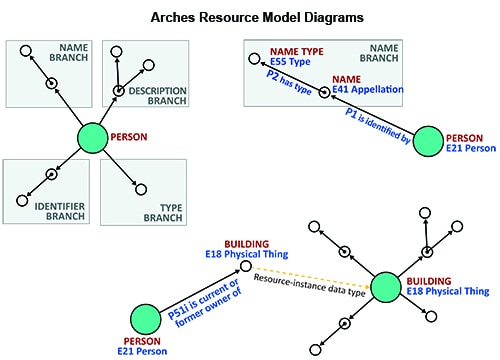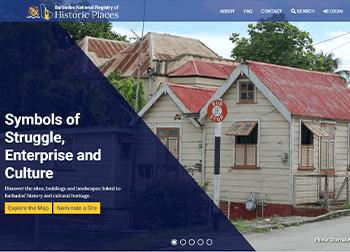Arches Project Bulletin
A Look Back at Arches in 2020 & Looking Ahead to 2021
January 2021
Dear Reader,
The Arches Project team, no doubt along with many others throughout the world, celebrated the New Year with hopes for a brighter and healthier 2021. In reflecting on 2020, which was certainly a difficult year as we all adapted to a world afflicted by COVID-19, we nevertheless saw a lot of activity within the Arches community. We are now happy to share the events and milestones that so many of you contributed to despite these trials. This Year In Review bulletin showcases the impressive amount of work that was accomplished by the Arches community in 2020! It also includes information on events and other developments coming soon.
Powered by Arches in 2020 and Beyond
In 2020, the Arches team became aware of several new implementations that are Powered by Arches. These implementations include:
- Jamaica National Inventory of Historic Places (above image, left)
- Barbados National Registry of Historic Places (above image, right)
- Jersey Heritage Historic Environment Record
- Ancient Monuments Index for England (WARDEN), presented at the December 2020 Arches Developer Meetup (starting at the 5:00 time mark)
- Qionglin Settlement, Kinmen County, Taiwan
- Getty Research Institute Archival Collection Tools:
We are also aware of several more projects that are either preparing or planning an implementation of Arches. These efforts are from various regions of the world, including the Isle of Man, Central Asia, South Asia, Sub-Saharan Africa, Belgium, the UK, and Mongolia. We look forward to the upcoming months as we will continue to showcase new or upgraded Arches implementations.
To note: Arches has been implemented by organizations worldwide, and we are always enthusiastic to discover new and upcoming implementations. If you would like your implementation featured on our website, email us at contact@archesproject.org. Please provide a brief description (<100 words), a screenshot, and a link to the implementation if it has been made public or to other published material.
Community Highlights
Arches Community and Audience Survey
Thank you to all community members who completed the Arches Survey in April 2020. We recognized that most of you would be transitioning to a Work From Home environment during the pandemic, and it was valuable for us to better understand and prioritize your needs as we share Arches-related information and events. As a result, we focused on providing more video-recorded virtual events in 2020, and we are planning more for 2021.
Webinars
Arches Version 5.0 Preview webinar: In February 2020, the Arches team hosted a webinar previewing the newly released Arches Version 5.0. This webinar covered technology upgrades, usability enhancements, and new and improved features.
Arches Version 5.0 Demo webinar: In August 2020, the Arches team hosted another webinar giving a tour and overview of the upgraded Arches Version 5.0 Demo Site demonstrating its key features including those that newcomers to Arches might want to explore, and how to register for access.
Both of these webinars were recorded and are now available, along with transcripts and slide decks, on the Arches videos page.
Developer Meetups
The Arches development team at Farallon Geographics, Inc. kickstarted a series of Arches Developer meetups on August 10th. While intended to be hosted in-person at their offices in San Francisco, the meeting moved online as a result of the pandemic. The second Developer Meeting took place on December 4th and featured presentations from several community developers about their work with Arches, including Andy Jones from Historic England, Phil Weir and Sarah Byrne from Flax&Teal Ltd., and Adam Cox from Legion GIS LLC. You can view the recordings on the Arches videos page.
If you are interested in attending future Arches Developer meetups, keep an eye on the Arches Development Forum for information about the next meeting, tentatively scheduled for March 2021.
Documentation Collaboration Effort
Two of our Arches community members, Adam Cox and Angela Labrador, began an initiative to update and improve Arches documentation. The goals of this project include:
- Update documentation for Arches Version 5.1.
- Improve organization and navigation, emphasizing clarity and consistent language.
- Better support the needs of a broader range of users (e.g., non-technical staff; IT support staff; developers) whose technological skills vary.
- Address as many long-standing GitHub tickets and previously identified issues with the documentation as possible.
Adam and Angela hosted a webinar providing an orientation to the Arches documentation, discussing the needs and goals of the documentation enhancement project, as well as how to contribute. Connect with Adam and Angela on the Arches Community Forum if you are interested in participating in or contributing to this effort.
Conferences
The Arches team is thankful for the many organizations who worked hard to transition annual in-person conferences and events to virtual ones. This year, the conferences we participated in to share information about Arches included:
- Association for Preservation Technology (APT) & National Trust for Canada 2020 Joint Conference, October 1-3, 2020
- Euromed 2020, November 2-5, 2020 (Recording available to view)
- CIDOC Conference 2020, December 10, 2020 (Recording available to view with a simple sign-up; the Arches segment begins at the 1:34:00 time mark)
We know that members of the community also presented their work with Arches during 2020. If you would like to share your work with Arches with the broader community, we encourage you to share it on the Arches Community Forum, alert us on social media, or email us at contact@archesproject.org.
Development Highlights
Software Upgrades and New Features
In 2020, the Arches Project welcomed the release of Arches Version 5, a monumental upgrade of Arches core software. Some key features of this release include the dependency upgrade to Python 3.7, and the use of Celery for background tasks and notification alerts. The release of Arches v5 also included the ability to create workflows to customize data management operations. Workflows can be created, for example, to track the status and outcomes of heritage impact assessments or of heritage designation processes. The latest release, Arches v5.1 in October 2020, also included major new features, such as bidirectional language support, enhanced and more granular user access security, and the ability to annotate high-resolution IIIF imagery.
For more information about these releases and for guidelines on how to upgrade your Arches implementation, please review the release notes for Version 5.0 and Version 5.1.
Arches Version 5 Demo Site
Following the core software releases of Arches v5.0 and v5.1, the Arches demo site has been upgraded to reflect the latest version so that those new to the platform can get a hands-on experience before beginning their own implementation. The Arches v5 Demo site features nearly 800 example resources that include test data from the Los Angeles Historic Resources Inventory and the Valley of the Queens in Egypt. Please note that the demo site has not been customized for any particular implementation, so some of the v5 upgrades will not be evident when using the site. A webinar overview and Q&A of the v5 demo site is available on the Arches videos page.
Arches Package Library and Modeling Documentation
In order to provide guidance and assistance to Arches implementers on creating and using Resource Models (data models) in Arches, new guidance on modeling and documentation is now available on the Arches Project website: the Arches Package Library and Arches Modeling Documentation.
The Arches Package Library will serve as the repository for documenting and sharing packages which include resource models and branches, thesauri and collection data, some configuration settings and customizations, and in some cases, actual sample resource data. Arches implementers can load shared packages into their own Arches implementations and adapt them according to their own use cases, as well as share the packages that they create so that other Arches community members can benefit from their modeling work.

The Arches Modeling Documentation includes an overview and description of the basic concepts behind data modeling in Arches, as well as a suggested methodology for creating models, and additional training resources for modeling. Both the Arches Modeling Documentation and the Arches Package Library are works-in-progress and were compiled by the Arches Resource Model Working Group (ARM WG). The ARM WG is open to Arches community members who are interested in participating in the group’s modeling discussions and contributing to the documentation and library. If you are interested in participating in the Working Group, please contact us at contact@archesproject.org.
Looking Ahead to 2021
Upcoming Development
The Arches team is happy to share some of the events and development work planned for 2021. First of all, the Arches for Science software development initiative is well underway and an initial version is expected to be completed in 2021. Arches for Science will extend the Arches Platform to provide a comprehensive system to help conservation scientists as well as others working with heritage-related scientific data to secure, retrieve, visualize, compare, and share their data, and manage project tasks in the lab. Another key development feature to keep an eye out for in 2021 is the Arches/Esri Integration: an add-in for Esri ArcGIS Pro that will allow Esri users to directly access, edit, and synchronize Arches data from their desktop GIS software.
For more information about Arches for Science and the Esri Integration, be sure to check out our Roadmap and Releases page.
UK User Group Meetup
Keep an eye out on the Arches Forum for details about the next UK Arches User Group Meeting for those in the UK who are interested in implementing Arches, or those who are already working on an Arches implementation. If you would like to attend and/or give a presentation about your project, please connect with Alastair MacIntosh from City of Lincoln or Stuart Cakebread from Historic England on the forum.
Potential Transition of Arches Community Forum to Discourse
As the Arches community continues to grow, the Arches Project team recognizes the need for a modern and updated community space to support discussion and collaboration. Therefore, we are considering transitioning the current Arches Forum hosted by Google Groups to Discourse, an open source discussion platform that will enable many new features to benefit the community. We will be in touch for input as we plan for a transition. A move to Discourse can include a migration of all existing posts from Google Groups to ensure that we do not lose any posts from our past. Be on the lookout for more information soon. We are very excited about an opportunity to upgrade the Forum and can’t wait to see how our community will grow and evolve with the support of this innovative software. If you have any questions, please don’t hesitate to post on the Forum or reach out to us more directly at contact@archesproject.org.
Webinar: Intro to the Arches Platform, Part 3 – Data Technology Concepts
Mark your calendars for January 21, 2021 as the Arches Team will kick off the new year with the third Webinar in our Introduction to the Arches Platform series. This webinar will include information on data modeling and controlled vocabularies and will explore how the underlying data structure and technologies of Arches can help support better search and discovery, interoperability, and data longevity.
The webinar will take place on Thursday, January 21, 2021 at 9:30 am (PST). To join the webinar, please register here.
The first two parts of this series detailing Arches capabilities and data management tools are available to view on the Arches Videos page.
Job Opportunities
Be sure to check out our Bid and Job Opportunities page where we feature Arches-related bid and job announcements that are brought to our attention. If you would like to post an Arches-related bid or job opportunity on this page, please post on the Arches forum with the relevant details, including a link to respond to or apply for the opportunity.
Find us on Social Media
Follow us on Facebook, Twitter, LinkedIn and YouTube to find out about the latest announcements, product releases, community updates and more.

